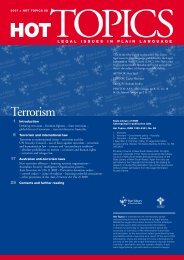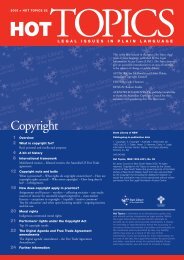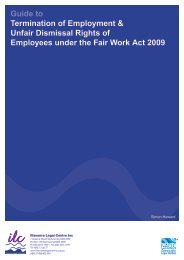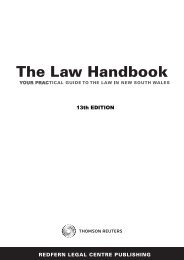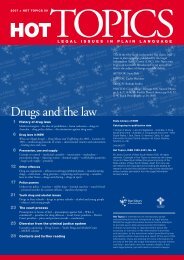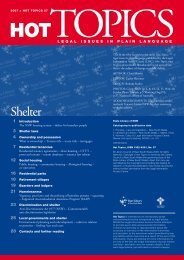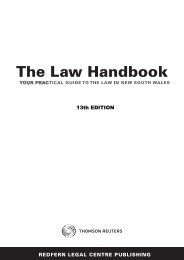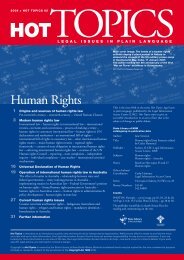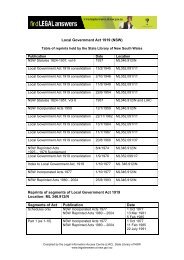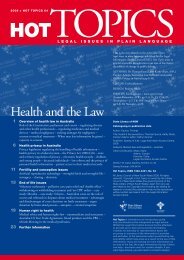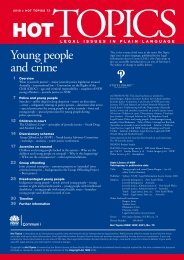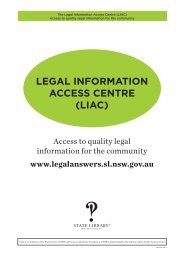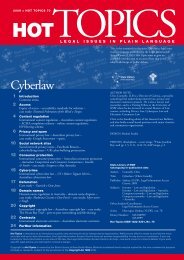Consumers | The law handbook - Legal Information Access Centre
Consumers | The law handbook - Legal Information Access Centre
Consumers | The law handbook - Legal Information Access Centre
- No tags were found...
You also want an ePaper? Increase the reach of your titles
YUMPU automatically turns print PDFs into web optimized ePapers that Google loves.
11 <strong>Consumers</strong> 379• a description of the damage to propertyor any losses incurred• a repairer’s report about the damage andquotes/receipts for any repairs necessary• the exact date and time the problem wasdiscovered• an outline of what was observed duringthe event.[11.560] TenantsPublic and private housingtenantsPublic and private housing tenants aregenerally responsible for energy bills andshould open an account when moving into anew property.If electricity and gas are included in therent, this will be written in the lease and thelandlord will be responsible for paying thebills. If a landlord fails to pay an account ontime and the tenant is facing disconnection,the tenant should contact NSW Fair Tradingor the Tenants Union for more information(see Making a complaint at [11.580]). Withthe exception of boarding houses, a landlordcannot charge a tenant for the supply ofelectricity unless there is a separate meterwhich complies with the regulations for theelectricity supplied, and the sum chargeddoes not exceed the maximum allowableamount under the AER Retail Exempt SellingGuideline July 2013. Landlords of boardinghouses can charge for utilities as a separatecharge on top of the room rate, provided:• they have notified the resident of theutility charge before entering into theoccupancy agreement, and• the amount charged is based on the costof providing the utility and a reasonablemeasure or estimate of the resident’susage (Boarding Houses Act 2012 (NSW),Sch 1, cl 7).Residents of boarding houses with complaintscan make a complaint to NCAT orthe Tenants Advice and Advocacy Service(visit www.tenants.org.au).Tenants in share houses should be awarethat the people whose names appear on anenergy account are responsible for bills.Tenants should ensure the names on theaccount are up-to-date and that an agreementis in place between residents forpaying the bills. For more information onshare housing, contact the Tenants Union orvisit www.tenants.org.au (see also chapter29, Housing).[11.570] Tenants in residentialparksTenants in residential parks may be suppliedelectricity directly from an energy retailer orfrom the park owner.Residential park tenants who have adirect supply contract with an energy retailerhave all the rights and responsibilitiesthat other customers would have under theNECF, outlined above.Permanent residents of residential parkswho are supplied electricity through thepark’s internal network and are meteredseparately have a more limited range ofrights and responsibilities prescribed by theResidential Parks Act 1998 (NSW) (RP Act),the AER Retail Exempt Selling Guideline July2013 (ES Guideline) and the Customer ServicesStandards for the Supply of Electricity toPermanent Residents of Residential Parks 2006(RP Standards).A permanent resident is defined as aperson occupying a site or dwelling in aresidential park under a residential tenancyagreement or residential site agreement asthe person’s principal place of address. Ifthe customer owns a cabin, van or a mobilehome in a park, but their primary residenceis elsewhere, they are referred to as aholiday park customer and different regulationsapply.



